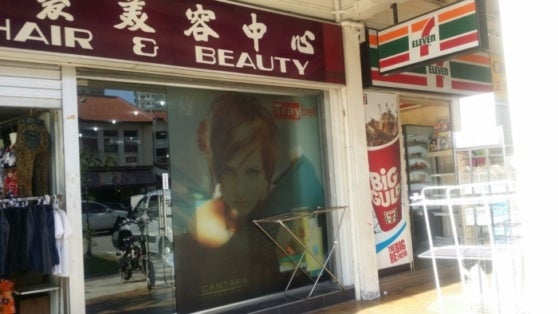While the world is actively becoming more progressive and accepting, societal issues still exist today as much as they did a few years ago. Racism, especially, still makes its way out of the lips of irresponsible individuals, who assume they can get away with making racist remarks in languages they think others can’t understand.
Recently, a Malay woman (let’s just call her Anis) from Singapore shared an experience she had when she was 15 years old, where she overheard a Chinese woman making racist remarks about her in Mandarin, reported Mothership.
She had decided one day to get a haircut with one of her friends, but they couldn’t afford to pay for the services available at “atas hair salons”.

For illustration purpose | source: patrick & daren
“Wanting to be just like my other cool 15-year-old friends, my friend and I wanted to get a layered haircut (it was the “in” thing back then, ok),” she wrote.
“But just like my other cool 15-year-old friends, we had a very tight budget. Atas hair salons that serve you tea while they blow dry your hair was out of the question. Instead, we walked into a neighbourhood hairdresser that had the sign “S$3.80 (RM11.57) HAIRCUT” plastered all over their walls.”
After settling down in their chairs, Anis and her friend were asked about how they would like their haircuts by their individual hairstylists.
Hers, in particular, had taken her hair that was thick and wavy and began ruffling it about. The hairstylist then scrunched her face and asked,
“Girl, you want to rebond your hair? You rebond your hair can look more Chinese, like your friend.”
Liking her naturally wavy hair and only having S$10 (RM30.45) in her pocket, Anis shook her head and said, “maybe next time”.

Source: liveabout. Com
The hairstylist then began cutting Anis’ hair and also started having a conversation with her colleague in Mandarin. Little did she know that Anis knew the basics of Mandarin and could understand what was being said.
“I’m not proficient in Mandarin, but thanks to a compulsory conversational Mandarin class that I had to take in school and my several years’ experience of watching the 9pm dramas on Mediacorp’s Channel 8, I knew fairly well that she was talking about me,” Anis wrote.
“In fact, I fully understand what these three phrases meant:
恶心 (Ě Xīn) which means “disgusting”
头发 (Tóu Fǎ) which means “hair”
马来人 (Mǎ Lái Rén) which means “Malay people”My Mandarin teacher would have been so proud of me, but I digress.”
While Anis thought that speaking up and telling her hairstylist off was the right thing to do, she refrained herself from doing so. After all, her hair was in the fate of her hairstylist and she wasn’t even sure if the hairstylist was talking about her.
About 45 minutes later, the hair cut was done, which Anis described to be “truly worth less than S$10”.
However, once she walked out of the salon, her friend suddenly said, “I’m so sorry about what happened”.
Not knowing what she was talking about, Anis frowned at her friend who explained what actually happened.
“Your hairdresser said Malay hair tend to always be curly and disgusting,” her friend said.

Source: angie’s list
Anis then went on to write that people may think she deserved such comments for not speaking up for herself and that she was being a “strawberry for making this an issue only a few years later when casual racism and Chinese privilege” had become such a “sexy topic”.
But she defends herself saying that she did not write that post to be part of the trend, but because “micro-aggression is mega uncomfortable for the victim, especially if that person is only 15 years old”.
“I’m already facing it then, at a young and impressionable age, can you imagine how much worse it could get when I’m older?” she said.
Anis then goes on to recount how a human resource executive had joked in a job interview that she wouldn’t hire her because “Malays are lazy”, and didn’t hear from her after the interview.
And on another occasion, her ex-colleague always stood next to her as she prepared change for customers because “Malays are bad at math”. Telling her manager about this, Anis was laughed at and told that her colleague was just looking out for her.

Source: retail news
Towards the end of her article, Anis writes that casual racism is not at all casual.
“The fact that comments like these still exist in 2019 is one of the reasons why I’m writing this article, after all: To let people know that casual racism isn’t the least bit casual,” she writes.
“While others can laugh and pass it off as a joke, it leaves a sting for the person on the receiving end. In my case, I felt self-conscious for a few years when someone speaks Mandarin in front of me, fearing that they were talking about me.”
She ends it by saying that her experience had left its mark as a constant reminder that racial tolerance, as opposed to acceptance, “can crumble with just a few words”.
Pretty sad that people these days are still playing the race card. Hopefully in time soon, racism will stop!
Also read: M’sian Shares Horror Story About Racist and Mean Bus Conductor










































